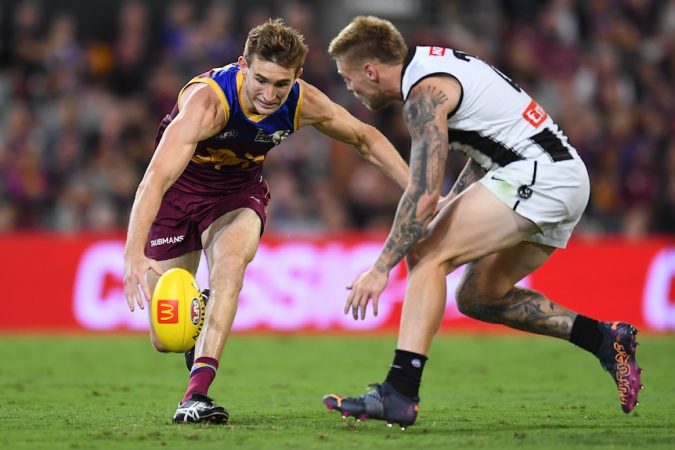
The record holder for the most AFL games officiated has backed the league’s crackdown on dissent, arguing that complaints and gestures from players seek to gain an advantage.
Key points:
- The AFL has reinforced the need for players to avoid dissent after a weekend where players were penalised for displays of frustration
- Shane McInerney said eliminating dissent was key to attracting and retaining thousands of officials needed across all levels of football
- McInerney said actions like asking umpires to look at replays were just “theatrics” designed to gain an advantage
The issue of umpire abuse came under the microscope during round 5 when players were penalised for visibly expressing frustration over umpires’ decisions, including for basic appeals with outstretched arms.
Shane McInerney, who umpired 502 AFL games between 1994 and 2019, said players were trying to undermine umpires.
“Actions like pointing at the scoreboard, asking the umpire to go and have a look at the replay, it’s just theatrics,” McInerney said.
On Tuesday, AFL football operations manager Brad Scott doubled down on the AFL’s hardline stance on dissent.
“You don’t get excuses because it’s an emotional game so we should condone bad behaviour,” Scott said.
“And to be honest the game’s condoned it for decades and we’re really clear that we’re not, there’s no acceptable level of dissent.”
Ahead of this season, the AFL warned clubs and players that rules on umpire abuse would be tightened, as it sought to set an example for the community level.
The AFL estimates there are about 6,000 fewer local umpires than there should be, with a rise in abuse seen as a contributing factor.
“It’s well understood that the behaviour seen at the elite level cascades down to the community and junior club level,” McInerney said.
Some players have warned it would be tough to completely stop players from physically responding to an umpire’s decision, arguing it is human nature to react emotionally during a match.
Western Bulldogs captain Marcus Bontempelli said there had been grey areas in the umpires’ interpretations of the rule.
“I think we can all agree with the rationale of supporting our umpires and their standing in the game and obviously adjusting our behaviours off the back of it,” Bontempelli told Fox Sports.
“But this will give us a bit more clarity around how we can best regulate our emotions.”
Collingwood skipper Scott Pendlebury said the media was the last group to understand the issue.
“The players all have a handle on it, the coaches pretty clearly say we know what to expect but it’s the media [and] guys commentating football that seem to have a big issue with it,” he said on Wednesday.
“And then that goes into the public forum because it gets spoken about so much.
“As players we are so clear that anything we do will be [a 50-metre penalty].”
Essendon captain Dyson Heppell agreed, saying umpires did “an amazing job”.
“We do need grassroots footy continuing and young kids wanting to umpire games and feel that they are respected,” he added.
McInerney said there was some confusion surrounding umpire dissent but an expectation had now been set that any form of dissent is not acceptable.
He said he believed players would be clever enough to adapt to the new norm.
“I think like with any new law that’s been brought in there’s always that knee-jerk, some call it an over-reaction,” he said.
“But I think we will see players this weekend just not even go near it.
Source: AFL NEWS ABC



